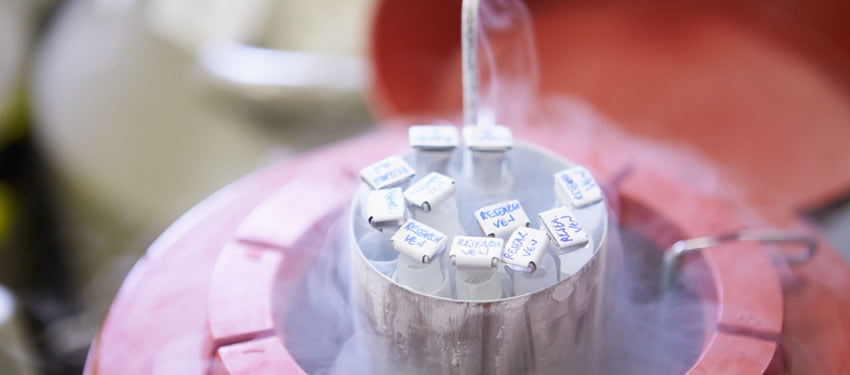Sperm Freezing
- Consultations
- Initial Consultation
- Fertility Assessment
- Fertility Treatments
- In-Vitro Fertislisation (IVF) & Intra – Cytoplasmic Sperm Injection (ICSI)
- Frozen Embryo Transfer (FET)
- Intra Uterine Insemination (IUI)
- Surgical Sperm Retrieval
- Egg Freezing
- Sperm Freezing
- Endometrial Scratch
- Embryo Glue
- EmbryoGen

What is sperm freezing?
Freezing or cryopreservation is the process of storing cells or tissue at a very low temperature in liquid nitrogen. Sperm stored in this way can be thawed at an appropriate time in the future and used for insemination or an IVF/ICSI cycle. There are many reasons for freezing sperm. It is used for the storage of donor sperm or as a back-up for men who may have a problem producing a sample when needed for an assisted conception procedure. It can also be used for men who wish to store their sperm for future use before undergoing treatment such as chemotherapy, which may damage their sperm-producing tissues.
Giving consent to sperm storage
All fertility clinics in the UK are licensed and inspected by the Human Fertilisation and Embryology Authority (HFEA). The HFEA ensure that the laws relating to fertility treatment and research (Human Fertilisation and Embryology Act 1990, amended 2009) are adhered to at all times.
Before you can store sperm samples you will have a consultation with a member of the laboratory team to discuss the process and to complete the necessary HFEA consent forms. These consent forms are designed to cover every eventuality, including how you wish your gametes or embryos to be treated in the event of your death or mental incapacity. You may also specify any extra conditions of your choice for the storage of your sperm (and embryos).
It is important that when you are giving consent you are able to do so freely. If you have any questions about the consent forms, or you feel that you have not received enough information to understand the consent forms and the implications of providing consent, please speak to a member of staff.
Before you complete these consent forms, you are entitled to see a counsellor to discuss the implications of giving consent. Please ask a member of staff if you would like to arrange a counselling appointment. Occasionally it may not be possible to see the counsellor before giving consent, for example if you are due to start chemotherapy in the next few days. In this case, we can arrange a counselling appointment after you have completed the consent forms in the knowledge that you can change or withdraw your consent at any time.
If you are giving consent ahead of treatment with your partner, ideally you should both give the same level of consent. This is particularly regarding the use of your information and the storage and use of your embryos.
The member of staff obtaining your consent should give you copy of the completed HFEA consent forms and your signed agreement to sperm storage. These are legal documents, please keep them safe for future reference.
Sperm storage and the law
Most patients can consent to store their sperm and embryos for up to 10 years. If you are storing sperm for fertility preservation for medical reasons, for example if you are about to undergo treatment for cancer, you may consent to store your sperm and embryos for up to 55 years.
For all patients, your sperm and embryos can only be stored for longer than 10 years if you or your partner are certified prematurely infertile by a medical practitioner. You must contact us before the 10 year expiry if you wish to keep your samples in storage. If you meet the criteria, your case will then be reviewed every 10 years up until the legal maximum storage period of 55 years. If you fail to contact CFC to request a review of your case, then your sperm will be discarded when your existing storage consent expires.
If you have a partner at the time that you are storing sperm, you may complete consent forms authorising your partner to be able to use your sperm in treatment in the event of your death or mental incapacitation. However, your partner will not be able to keep your sperm in storage beyond your existing consent. You should give this serious consideration when deciding how long to consent to store your sperm for.
It is important to understand that if you die or become mentally incapacitated during that time that your sperm is in storage, your sperm cannot be used in treatment unless a specific written consent for this has been provided and a partner has been named. If you do not have a partner when you sign these consent forms, or you change partners, it is therefore very important that you update your consent forms at the earliest opportunity. Please contact us if this is the case.
You can withdraw or change your consent at any time up until the point at which sperm or embryos have been used in treatment or training. This is particularly important if you and your partner split up and you have consented to your partner being able to use your sperm/ embryos in treatment in the event of your death or mental incapacity. If you wish to withdraw or change your consent, please contact the clinic so that we can arrange for the necessary forms to be completed.
Procedures involved in collecting sperm samples
To produce a semen sample for freezing there are some general guidelines that you should follow:
1) The sample should be produced by masturbation (not by intercourse)
2) The sample should be collected in a sterile container (available from us)
3) We have facilities for sample production. However, if you prefer the sample may be produced at home andbrought to the clinic within one hour of production. Please speak with the laboratory team on 02381 20 8407 if you wish to arrange this.
For what treatments can my sperm be used?
When you wish to use your sperm samples in the future, you may wish to do so through another clinic elsewhere. Sperm can be used in simple insemination procedures such as intrauterine insemination (IUI) or more complex assisted conception treatments such as in vitro fertilisation (IVF) and intracytoplasmic sperm injection (ICSI). Even if the quality of the sperm is poor, it is worth storing for future use, because procedures such as ICSI can give a realistic chance of pregnancy.
Cost of freezing and storage of sperm
For oncology patients the NHS funds the freezing and storage of sperm for the first 10 years. Continued storage after this period is currently £150 per year.
For patients wishing to freeze their sperm for any other reason, this is on a self-funding basis. Please contact us for further information.
Please note that should you wish to use your sperm for fertility treatment you will be charged for this treatment.
Loss of contact/failure to pay storage fees
When you consent for your sperm to be stored at our centre you enter into an agreement with us that you will keep your contact details up to date and pay any storage fees required. The HFEA storage consents that you complete allow us to legally store your gametes and embryos; however they not mean that we are legally obliged to continue storing them if you break the terms of your agreement with the clinic.
It is vitally important that you keep us informed of any changes to your contact details and pay your storage fees promptly. If we lose contact with you, or you do not pay your storage fees, we reserve the right to discard your samples.
Risk of contamination
There is a theoretical risk of viral (e.g. HIV, Hepatitis B & C) cross-contamination between samples that are stored in liquid nitrogen. The actual risk is unknown and although there have been no reported incidences of such cross-contamination between frozen sperm samples, all patients are now required to be screened for HIV and Hepatitis B & C before we freeze any sperm samples; HIV, Hepatitis B & C positive patients cannot store their samples in containers alongside samples from patients who have screened negative for the viruses.
Other important points
1) All relevant consent forms must be completed and signed before storage
2) You may freeze up to three sperm samples
3) All information you provide us is strictly confidential
4) Samples cannot be frozen until virology screening results have been received
Follow up service for oncology patients
For men storing sperm ahead of cancer treatment, we offer a follow up semen analysis service for after you have finished your treatment. From the results of the semen analysis we will be able to see whether your treatment has affected your fertility. This can be useful information to help you plan for the future. We normally recommend that you wait at least 6 months after you have finished your treatment before you arrange an appointment. To book a follow up semen analysis please contact us.
Further information
If you have any questions or would like further information, please contact us.
TESTIMONIALS
Mr Brook, helpful, kind manner, explain things in an easy to understand way. Gave me confidence in my treatment.


